In Abuja, a city known more for political posturing than policy innovation, the National Youth Council of Nigeria (NYCN) is attempting a quiet reinvention.
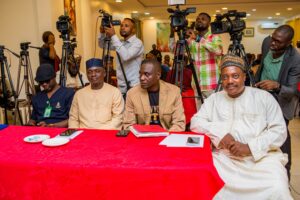 On July 14th, the Council convened its annual National Leadership Retreat, a three-day gathering of youth leaders, policymakers, and civil society actors, with the declared aim of “repositioning” the NYCN for national relevance.
On July 14th, the Council convened its annual National Leadership Retreat, a three-day gathering of youth leaders, policymakers, and civil society actors, with the declared aim of “repositioning” the NYCN for national relevance.
Though such retreats are common—and often ceremonial—this year’s edition signalled a bolder intent. Solomon Adodo, the NYCN’s President, used the occasion to unveil a policy shift with symbolic and practical undertones: Nigeria’s Internally Displaced Persons (IDPs), he said, should no longer be viewed as victims of conflict and circumstance, but as potential nodes of “internal productivity.”
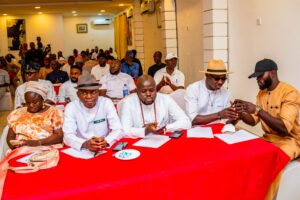 “We are no longer referring to them as displaced persons,” Adodo declared. “They will become centres of productivity. Every young Nigerian, regardless of status, has a role to play in nation-building.”
“We are no longer referring to them as displaced persons,” Adodo declared. “They will become centres of productivity. Every young Nigerian, regardless of status, has a role to play in nation-building.”
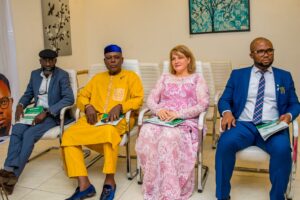 The reframing—more linguistic than legislative at this stage—is typical of recent efforts by the NYCN to remain relevant amid a crowded field of youth-focused platforms. Once seen as a pipeline for national leadership, the Council has in recent years become mired in factionalism and institutional drift. Adodo, a combative yet pragmatic figure, is attempting to reverse this.
The reframing—more linguistic than legislative at this stage—is typical of recent efforts by the NYCN to remain relevant amid a crowded field of youth-focused platforms. Once seen as a pipeline for national leadership, the Council has in recent years become mired in factionalism and institutional drift. Adodo, a combative yet pragmatic figure, is attempting to reverse this.
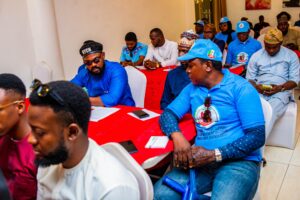 Held under the theme “Repositioning NYCN for National Impact and Youth-Driven Development,” the retreat brought together zonal and state coordinators, National Executive Council (NEC) members, and representatives of government ministries and donor organisations. It also offered a chance to reassert the NYCN’s role as a broker between the state and Nigeria’s vast youth demographic—estimated at more than 70 million.
Held under the theme “Repositioning NYCN for National Impact and Youth-Driven Development,” the retreat brought together zonal and state coordinators, National Executive Council (NEC) members, and representatives of government ministries and donor organisations. It also offered a chance to reassert the NYCN’s role as a broker between the state and Nigeria’s vast youth demographic—estimated at more than 70 million.
Support from the political establishment was evident. A message from Senate President Godswill Akpabio, delivered by proxy, struck a conciliatory note:
“The Nigerian Senate stands firmly with the youth. We are ready to walk with you—not behind or ahead, but shoulder to shoulder. Under President Bola Tinubu’s Renewed Hope Agenda, youth must not only be heard—they must be involved.”
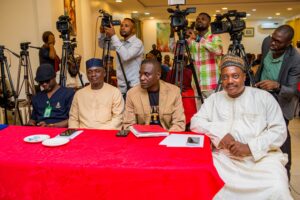 That language reflects the government’s broader strategy: projecting inclusivity without necessarily yielding structural power. Youth participation in governance remains more symbolic than systemic; decision-making, in practice, is still an older man’s game.
That language reflects the government’s broader strategy: projecting inclusivity without necessarily yielding structural power. Youth participation in governance remains more symbolic than systemic; decision-making, in practice, is still an older man’s game.
Still, the NYCN under Adodo has been active. Over the past year, it has launched initiatives ranging from digital literacy campaigns to peacebuilding workshops. The current leadership has also attempted to reestablish links with federal institutions and donor partners.
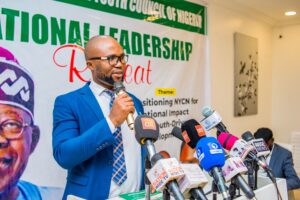 This week’s retreat includes sessions on governance reform, performance metrics, and institutional accountability—terms often deployed, less often implemented. Yet the mood among delegates was notably optimistic. The Council, long dismissed as a relic of an earlier era, is trying to adapt. Whether it succeeds will depend less on the rhetoric of retreats, and more on the grit of reform—and the willingness of Nigeria’s political elite to share real power with its youthful majority.
This week’s retreat includes sessions on governance reform, performance metrics, and institutional accountability—terms often deployed, less often implemented. Yet the mood among delegates was notably optimistic. The Council, long dismissed as a relic of an earlier era, is trying to adapt. Whether it succeeds will depend less on the rhetoric of retreats, and more on the grit of reform—and the willingness of Nigeria’s political elite to share real power with its youthful majority.























